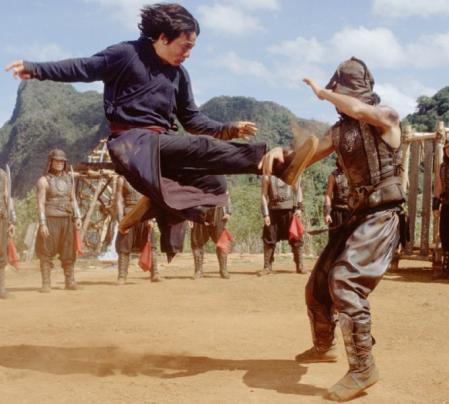

|
Around The World In 80 Days
3 out of 10 |
 |
|
Chunder with Chan When you see a Jackie Chan movie, you know exactly what you're getting. Quality acting? Plot? Intelligent dialogue? They're all notable for their total absence, and usually to be replaced with loads of slapstick, twee smultz with crummy jokes and a bunch of one dimensional characters and joke Englishmen strutting around the stage. A pinnacle of French literature, the book "Le Tour Du Monde En Quatre-Vingts Jours" or "Around The World In 80 Days", by Jules Verne was an amazing read, detailing the struggles of French manservant, Passepartout to keep his master, Phineas Fogg, on course and on time on his bizarre bet that he can circumnavigate the world in the new age of steam locomotion and organised shipping routes. For Chan, the basic idea offers the chance for a movie that, in essence, is a series of marginally linked separate one-scene stories, each invariably ending in a carefully choreographed chase and fight.and bears as much similarity to the original story as a Big Mac and French fries does to health food. Whilst Steve Coogan does an exemplary job as the quintessential Englishman, Phineas Fogg, he's up against acting that's so embarrassingly bad as to be putrid, for example, even though Ewen Bremner actually is a Scot, he sounds utterly phoney, as well as a story that's undergone tectonic scale disfigurement. For instance, in the screenplay by the three Davids of David N. Titcher, David Benullo and David Andrew Goldstein, as Chan, of Chinese origin, is replacing the French Passepartout, they have had to write in Monique La Roche from Paris, entirely irrelevant to the plot as the nominal love interest who tags along for no real reason, and forcing deletion of Fogg and Passepartout's daring rescue of the Indian princess in the original story. One can understand that in a "fun" knockabout script, mistakes like claiming Edison invented the light bulb can be understood, but for a man like Chan who actually comes from Hong Kong, having such a lack of knowledge of his own cultural history is somewhat disturbing. Not only was China known to its inhabitants in the Nineteenth Century as the "Middle Kingdom", but the medieval communities of rural China did not tend have branches of "Shoppers Drug Mart" offering to process the local peasants holidays snaps. Whilst Lord Kelvin was nowhere to be seen in either the book or the earlier movie, the three Davids have created a highly accurate portrait of this, their main adversary, about the sole factual item in the entire movie. Recreated magnificently by Jim Broadbent, this most arrogant of scientists once commented in an address to an assemblage of physicists at the British Association for the advancement of Science in 1900, "There is nothing new to be discovered in physics now. All that remains is more and more precise measurement." Additionally, as in the supern 1956 adaptation, starring David Niven, Chan's version features various other personalities such as Owen Wilson, with whom he has already featured in several movies, Arnold Schwartzeneggar as Prince Hapi to justify a joke about "Hapi Birthday", Richard Branson and Cathy Bates. As the story drifts into surreal irrelevance, we inevitably discover he is, of course, a member of a group of heros known as the Tigers who are fighting against the evil Black Scorpions and the screen floods with martial art battles. From the first line on the opening credits we knew the story was just a sham to allow Chan a chance to pour in the knockabout stunts for which he is famous. Why does he have to mutilate a fine novel to do it when the whole basis of the book is achieving something seemingly impossible with the feasible. For Disney who have worked so hard
to make films like "Alamo" and "King Arthur" to
be as accurate as possible, it represents a vast leap backwards. The
message is clear, rent the 1956 version with David Niven. It was one
of the greatest films ever made and is poles apart in terms of quality
from one that "smells like a dead horse".
Film Critic: Robert L Thompsett
|
|